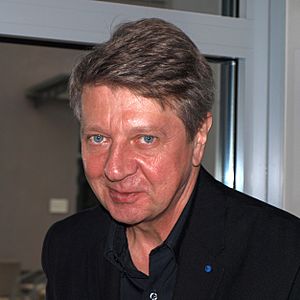Krzysztof Matyjaszewski facts for kids
Quick facts for kids
Krzysztof Matyjaszewski
|
|
|---|---|
 |
|
| Born | April 8, 1950 Konstantynów Łódzki, Poland
|
| Citizenship | Poland, United States |
| Alma mater | Lodz University of Technology |
| Known for | Atom transfer radical polymerization |
| Awards |
|
| Scientific career | |
| Fields | Chemistry Polymer chemistry |
| Institutions | Carnegie Mellon University |
| Doctoral students | Kathryn Beers |
Krzysztof "Kris" Matyjaszewski, born on April 8, 1950, is a famous Polish-American chemist. He is a top professor at Carnegie Mellon University. Professor Matyjaszewski is best known for discovering something called atom transfer radical polymerization (ATRP). This is a special way to make new materials called polymers. His discovery has changed how scientists create many different types of materials.
Because of his amazing work, Professor Matyjaszewski was chosen to be a member of the National Academy of Engineering in 2006. He also joined the National Academy of Sciences in 2019. These are very high honors for scientists. He has received many important awards, including the Wolf Prize in Chemistry in 2011. He also won the Dreyfus Prize in the Chemical Sciences in 2015 and the Grand Prix de la Fondation de la Maison de la Chimie in France in 2020. In 2023, he received the National Academy of Sciences Award in Chemical Sciences.
Education and Career Highlights
Professor Matyjaszewski started studying chemistry in Poland in the late 1960s. He went to the Lodz University of Technology and later to the Petrochemical University in Moscow. He earned his doctorate degree in 1976. After that, he did more research at the University of Florida in the United States.
From 1978 to 1984, he worked as a researcher for the Polish Academy of Sciences. He also spent time teaching and researching at the University of Paris in France. In 1985, he joined the chemistry department at Carnegie Mellon University in the U.S. There, he started and now leads the Center for Macromolecular Engineering. This center gets money from both companies and government groups like the National Science Foundation.
In 1998, Professor Matyjaszewski became the J.C. Warner Professor of Natural Sciences. In 2004, he received the highest honor a professor can get at Carnegie Mellon: University Professor. He also teaches in other departments at the university.
From 1994 to 1998, he was in charge of the chemistry department at Carnegie Mellon. He helped bring in more talented professors who were experts in polymer chemistry. During this time, he also created a group with different companies. This group worked together to understand and use his ATRP discovery in new products. Another group, the CRP Consortium, started in 2001. It continues to train scientists from universities and companies. This helps them create new materials using his methods.
Professor Matyjaszewski has invented many things. He is listed as a co-inventor on 72 U.S. patents and more than 150 international patents. This means his ideas have been protected and can be used to create new technologies.
He is also a very important teacher in the field of polymer chemistry. He has guided over 300 students, from college students to those working on their doctorates. He has written 25 books and over 1300 scientific papers. His work has been mentioned by other scientists more than 203,000 times. This makes him one of the most mentioned chemists in the world.
Recognitions and Awards
Professor Matyjaszewski has received many awards for his important work. Some of these include the 2023 National Academy of Sciences Award in Chemical Sciences. He also won the 2017 Benjamin Franklin Medal in Chemistry. In 2015, he received the Dreyfus Prize in the Chemical Sciences.
He has been honored by the American Chemical Society (ACS) many times. These awards include the 2002 Polymer Chemistry Award and the 2011 Applied Polymer Science Award. He also received the 2020 Paul Flory Polymer Education Award for his teaching. He is a member of several important academies, including the U.S. National Academy of Engineering and the National Academy of Sciences.
His home country, Poland, has also recognized his achievements. In 2004, he received the annual Prize of the Foundation for Polish Science. This is the most important science award in Poland. In 2005, he became a foreign member of the Polish Academy of Sciences. He has also received honorary degrees from many universities around the world. These include universities in Poland, Israel, Belgium, and Greece.
See also
 In Spanish: Krzysztof Matyjaszewski para niños
In Spanish: Krzysztof Matyjaszewski para niños
- List of Poles
- Timeline of Polish science and technology
 | Bessie Coleman |
 | Spann Watson |
 | Jill E. Brown |
 | Sherman W. White |

